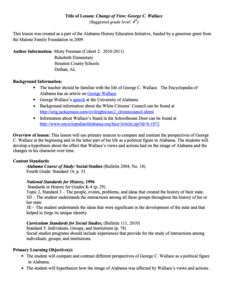Curated OER
Brown v. Board of Education of Topeka
Twelfth graders explore desegregation as it occurred at various stages in United States history. They specifically chronicle the role of South Carolina in the desegregation case of Brown v. Board of Education.
Curated OER
Brown v. the Board of Education: Success or Failure?
Learners identify reactions to Brown v. Board of Education. They evaluate the extent to which Brown was successful in desegregating American education. Students evaluate the role of the judiciary in affecting societal change.
Curated OER
Brown vs. the Board of Education: Still Opening Eyes
When we use our collective voices to help others, we all benefit.
Anti-Defamation League
Sixty Years Later
Has any progress been made in desegregating schools since 1954's Supreme Court case Brown v. Board of Education? To find out, class members examine charts and graphs representing U.S. schools' racial, ethnic, and socioeconomic...
Center for Civic Education
The Power of Nonviolence: Rosa Parks: A Quest for Equal Protection Under the Law
Teach young historians about the historical legacy of Rosa Parks with a multi-faceted lesson plan. Pupils follow stations and use journals to explore prominent events, analyze primary resource documents, and engage in interesting...
Teaching Tolerance
Using Photographs to Teach Social Justice | Legal Action: The Supreme Court
A social justice lesson focuses on the Supreme Court case Loving v. Virginia which struck down laws that prohibited marriages between African Americans and white Americans. The lesson begins with class members examining a photograph of...
Center for History and New Media
Founding of the Laurel Grove School and Other "Colored" Schools in Fairfax County, 1860–1890
The right to public education was not always so clear in American history. Readers study several primary and secondary source documents, including property deeds, maps, and photographs, about the founding of local schools during the...
Curated OER
Supreme Court Decisions and the CRM
Eleventh graders investigate different Supreme Court decisions. In this Civil Rights lesson, 11th graders research and read the decisions of specific court cases. students write a short essay describing the effects of these cases.
Teaching for Change
A Documents-Based Lesson on the Voting Rights Act
How did the Voting Rights Act affect the daily lives of American citizens? A document-based lesson developed by the Student Non-Violent Coordinating committee (SNCC) presents a case study of the impact of the Voting Rights Act of 1965 on...
National First Ladies' Library
Trouble in Little Rock: The Desegregation of Central High School
Middle schoolers study one aspect of the Civil Rights Movement in the United States; the battle over desegregating the public schools. They study the desegregation of Central High School in Little Rock, Arkansas by producing a newspaper,...
Soft Schools
Civil Rights
Informational text about the Civil Rights Movement challenges young historians to prove their reading comprehension skills with six multiple choice questions. After answers are submitted a new screen displays a score, answers—correct and...
Curated OER
Boundary Crossing
Seventh graders explore the issues that arose as a result of boundary crossing. In this US History lesson, 7th graders research supreme court cases in regards to crossing boundaries. Students present their findings to the class.
Curated OER
The Fight to End "Separate but Equal" in American Schools
Students study the court cases related to Brown v. Board of Education and the "separate but equal" standard established by Plessy v. Ferguson. They create an informational display that can be used to teach others the particulars of the...
Curated OER
Separate But Equal Video
Eighth graders watch the video "Separate But Equal." They choose an incident or event from the video that is interesting or meaningful to them and write an objective news article and an editorial.
Smithsonian Institution
Separate is Not Equal: Fight for Desegregation
Separate is not equal! An eye-opening lesson delves into the past to understand the fight for desegregation and how it impacted African American communities. Academics complete two one-hour lessons using documents, photographs, and...
Smithsonian Institution
Re-Segregation of American Schools: Re-Segregation
Examine the re-segregation of public schools in a thought-provoking resource. Young scholars read articles and primary sources, complete worksheets, and watch a video to explore the idea that desegregation made schools more segregated....
Curated OER
Brown v. the Board of Education
Learners explain the history of race discrimination in the US and about the Brown vs the Board of Education trial.
Curated OER
Re-Examining Brown
High schoolers explore and describe the impact of segregation on African Americans and other non-white minorities. In this segregation lesson plan students identify, research and report on the legal cases that led to the Brown vs. Board...
School Improvement in Maryland
Analysis of Marbury v. Madison
Should the United States Supreme Court have the power of judicial review? Instructors guide class members through a review of Marbury v. Madison and assist class members in writing a brief of the case. As independent practice,...
Alabama Department of Archives and History
Change of View: George C. Wallace
Who exactly was George C. Wallace? A great lesson plan provides young historians with a hands-on activity, direct instruction, and discussion to learn about Wallace, why he was an important figure, and why he changed his mind about...
Judicial Branch of California
Separate But Equal - Is It Black or White?
The story of Ruby Bridges and the case of Brown vs. The Board of Education are fantastic tools for discussing the concept of separate but equal. Kids tackle some big questions about what is fair, what is civil, and what rights or laws...
Curated OER
Evolving Views about Minority Rights in the United States
Tenth graders compare and contrast majority and minority outlooks on issues. In this social justice lesson, 10th graders research majority and minority values regarding the Salem Witch Trials, Plessy v. Ferguson, the McCarthy hearings,...
Curated OER
The Legacy of the Warren Court
Students examine the major decisions by the Supreme Court when Warren was the Chief Justice. In groups, they research the life and other works of Earl Warren and discuss how ones background can influence decisions. They also examine...
Carolina K-12
African Americans in the United States Congress During Reconstruction
The Civil Rights Act of 1866, which granted citizenship to all males in the U.S., resulted in the first African Americans to be elected to Congress. Class members research 11 of these men, the challenges they faced, and craft...

























